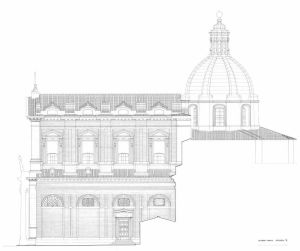
don Giuseppe Nespeca
Giuseppe Nespeca è architetto e sacerdote. Cultore della Sacra scrittura è autore della raccolta "Due Fuochi due Vie - Religione e Fede, Vangeli e Tao"; coautore del libro "Dialogo e Solstizio".
Loving enemies and turning the other cheek: whyever?
Beatitudes of role reversal
From «Master» to «Lord», ‘Word’ that realizes
Presentation of the Lord
Jesus in the Synagogue, to return to the Father's Dream
Wedding at Cana: between water and wine... desolation or love
Epiphany: more adventure is needed
Christmas: Easter. Breathing for me
COMPLEXITIES OF EXISTENCE (by Francesco Giovannozzi, psychologist and psychotherapist)
The complexities of existence.
Life is not always easy and the complexities of existence have always existed; they accompany us along the path of our daily lives.
In times gone by, it was often the family doctor who listened to them and associated them as related to the health of his patients and gave them advice.
When, on the other hand, the difficulties were of an ethical nature, people turned to the priest who, through accompaniment and confession, gave suggestions on how to redeem themselves.
Later, with the discovery of psychology in its various forms, people became concerned with human problems. The figure of the psychologist in the broad sense or the psychiatrist joined the previous figures. As far as the field of the psychiatrist is concerned more specifically, the problems are not visible illnesses.
People who are afflicted by life complications are not patients in the usual sense. They can be normal, productive people - as normal as one can be in our community.
Generally, these daily contrarieties may concern interpersonal relationships, the way one works, performance issues... but also the issue of living honestly, in line with one's principles and personal beliefs. Then there are the contrarieties of practical life, which can often accentuate the others.
A lot also depends on our typical behaviours with which we defend ourselves or construct our way of life, and which were formed at an early period - unconsciously imitating people who had meaning in our lives (the so-called character, very succinctly).
Jung argues that the child's unconscious depends on the parental unconscious.
Almost always in my long professional practice I encountered this construct, and I had to struggle to make people understand that it was the parents who triggered the behaviour.
Often when I encountered parents who did not want to accept certain responsibilities, the latter would resort to excuses that did not hold up in any way.
In relationships between individuals, the most annoying issue concerns how we experience our affections.
There are aggressive people who seek people to dominate. There are those who exploit the other (the unwary); and so on.
In love relationships, one has to pay attention to how each one stands towards the other. Let us give some examples.
A woman who suffers because of her spouse who hinders her every development (or vice versa) must understand or be helped to understand that she has somehow sought this situation, and that it is only by finding confidence in her own possibilities and ability to manage herself that she will find relief from her pains.
Otherwise, i.e. if he does not discover his own potential, not even by separating will he solve his problems - because he will unconsciously seek the same kind of spouse.
Only people who are able to respect each other's needs and interests are capable of adult love. We often confuse our own desire with that of the other.
How many times in counselling with couples have I encountered this.
In job difficulties we often find people who move from one job to another because they are not satisfied with the lack of recognition. It may be, for example, an individual with grandiose ideas about his or her aptitudes who has to seek admiration in the work environment .
Then there are people who do creative work and feel that they do not produce as they would like. Here we are often faced with an unachievable perfectionism. Often such individuals are unable to admit that they have limits, and are confronted with their real capabilities.
It then happens that many people turn to an analyst because although they do not have a form of depression, they are not happy with themselves.
In his Psychoanalysis of Contemporary Society, Erich Fromm argues that consumerism leads us to an 'alienation from self'. By 'alienation' he means that which in principle belongs to man and then becomes foreign to him - eventually dominating us.
We must be as others want us to be.
Advertising and fashion itself also consciously influence us, and in this way if we do not conform we can feel backward.
We often get into conflict between our beliefs and the need to 'please' people.
Of course we do not have to be isolationists, but even here a proper balance 'saves' us, since repudiating certain fundamental tenets of our way of being does a lot of damage.
May the coming Christmas enlighten us, show us the way. Not infrequently, here too, we match current population trends, and often forget its true meaning.
Francesco Giovannozzi Psychologist-psychotherapist
Different Soul of Mary, in Visitation
The ability to be amazed at things around us promotes religious experience and makes the encounter with the Lord more fruitful. On the contrary, the inability to marvel makes us indifferent and widens the gap between the journey of faith and daily life (Pope Francis)
La capacità di stupirsi delle cose che ci circondano favorisce l’esperienza religiosa e rende fecondo l’incontro con il Signore. Al contrario, l’incapacità di stupirci rende indifferenti e allarga le distanze tra il cammino di fede e la vita di ogni giorno (Papa Francesco)
An ancient hermit says: “The Beatitudes are gifts of God and we must say a great ‘thank you’ to him for them and for the rewards that derive from them, namely the Kingdom of God in the century to come and consolation here; the fullness of every good and mercy on God’s part … once we have become images of Christ on earth” (Peter of Damascus) [Pope Benedict]
Afferma un antico eremita: «Le Beatitudini sono doni di Dio, e dobbiamo rendergli grandi grazie per esse e per le ricompense che ne derivano, cioè il Regno dei Cieli nel secolo futuro, la consolazione qui, la pienezza di ogni bene e misericordia da parte di Dio … una volta che si sia divenuti immagine del Cristo sulla terra» (Pietro di Damasco) [Papa Benedetto]
And quite often we too, beaten by the trials of life, have cried out to the Lord: “Why do you remain silent and do nothing for me?”. Especially when it seems we are sinking, because love or the project in which we had laid great hopes disappears (Pope Francis)
E tante volte anche noi, assaliti dalle prove della vita, abbiamo gridato al Signore: “Perché resti in silenzio e non fai nulla per me?”. Soprattutto quando ci sembra di affondare, perché l’amore o il progetto nel quale avevamo riposto grandi speranze svanisce (Papa Francesco)
The Kingdom of God grows here on earth, in the history of humanity, by virtue of an initial sowing, that is, of a foundation, which comes from God, and of a mysterious work of God himself, which continues to cultivate the Church down the centuries. The scythe of sacrifice is also present in God's action with regard to the Kingdom: the development of the Kingdom cannot be achieved without suffering (John Paul II)
Il Regno di Dio cresce qui sulla terra, nella storia dell’umanità, in virtù di una semina iniziale, cioè di una fondazione, che viene da Dio, e di un misterioso operare di Dio stesso, che continua a coltivare la Chiesa lungo i secoli. Nell’azione di Dio in ordine al Regno è presente anche la falce del sacrificio: lo sviluppo del Regno non si realizza senza sofferenza (Giovanni Paolo II)
For those who first heard Jesus, as for us, the symbol of light evokes the desire for truth and the thirst for the fullness of knowledge which are imprinted deep within every human being. When the light fades or vanishes altogether, we no longer see things as they really are. In the heart of the night we can feel frightened and insecure, and we impatiently await the coming of the light of dawn. Dear young people, it is up to you to be the watchmen of the morning (cf. Is 21:11-12) who announce the coming of the sun who is the Risen Christ! (John Paul II)
Per quanti da principio ascoltarono Gesù, come anche per noi, il simbolo della luce evoca il desiderio di verità e la sete di giungere alla pienezza della conoscenza, impressi nell'intimo di ogni essere umano. Quando la luce va scemando o scompare del tutto, non si riesce più a distinguere la realtà circostante (Giovanni Paolo II)
duevie.art
don Giuseppe Nespeca
Tel. 333-1329741
Disclaimer
Questo blog non rappresenta una testata giornalistica in quanto viene aggiornato senza alcuna periodicità. Non può pertanto considerarsi un prodotto editoriale ai sensi della legge N°62 del 07/03/2001.
Le immagini sono tratte da internet, ma se il loro uso violasse diritti d'autore, lo si comunichi all'autore del blog che provvederà alla loro pronta rimozione.
L'autore dichiara di non essere responsabile dei commenti lasciati nei post. Eventuali commenti dei lettori, lesivi dell'immagine o dell'onorabilità di persone terze, il cui contenuto fosse ritenuto non idoneo alla pubblicazione verranno insindacabilmente rimossi.



















